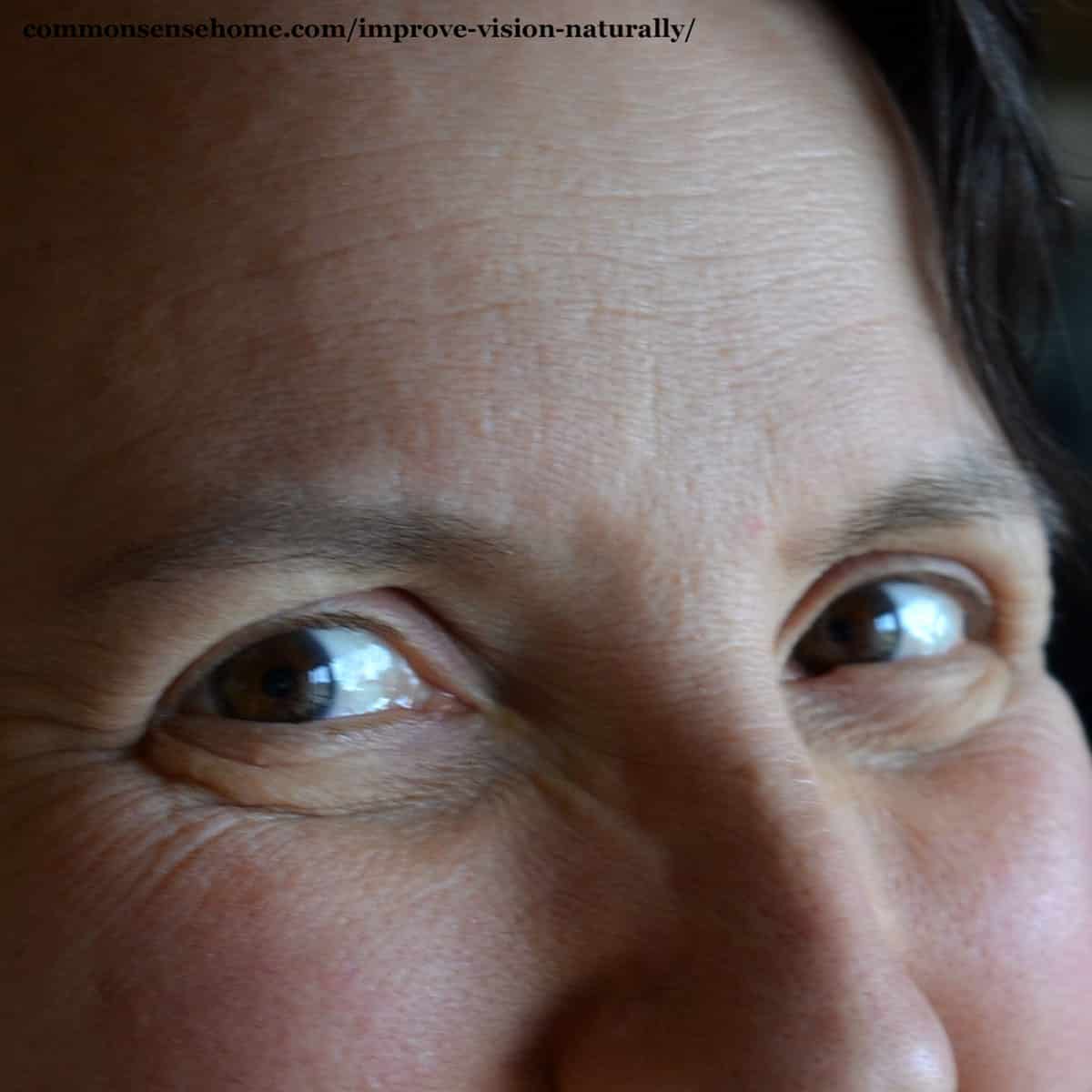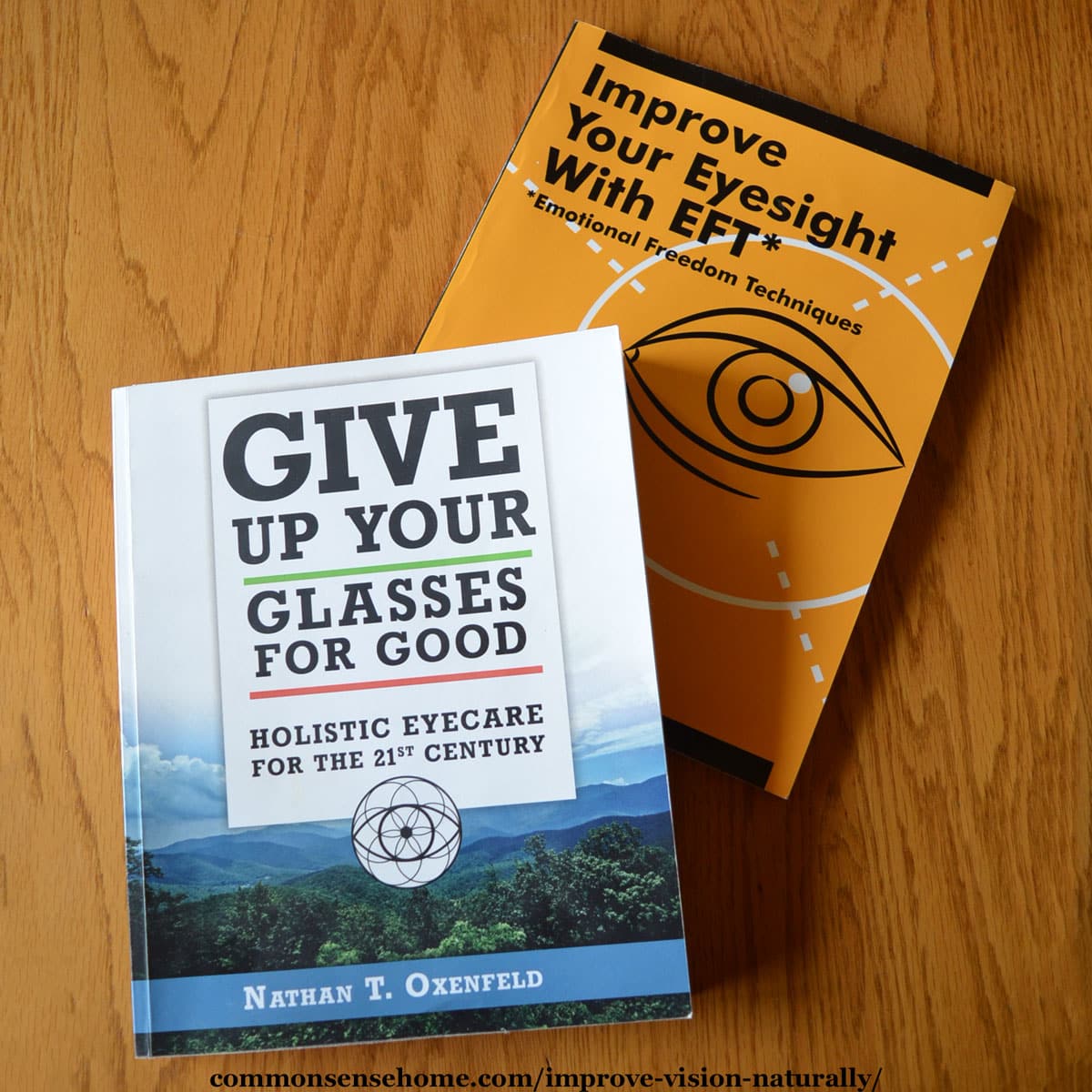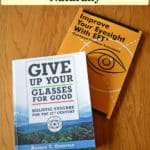How to Improve Vision Naturally (I did it)
This post may contain affiliate links. Read my full disclosure here.
A number of readers have asked me what I’ve done to improve my vision naturally, so I decided to put the information together here. I’ll talk about foods, supplements, eye exercises, and other techniques that may improve eye health.

Table of contents
My Vision Problem Story
In April 2021, I went into the eye doctor because my eyes were bothering me. I am extremely nearsighted, having worn glasses or contact lenses since first grade (over 40 years).
At that time, I was seeing excessive floaters and lightening, and having trouble focusing. When I went in for my exam, the doctor said I had cataracts. She suggested cataract surgery, and bifocal lens implants.
Since I’m only 51, I was reluctant to jump into surgery. She gave me a stronger prescription to cut through the haze, and we decided to check my eyes in a few months to see how the cataracts were progressing.
I didn’t have cataracts at my previous exam two years prior. With nearsightness like mine, once cataracts show up, they usually progress quickly. She sent me home with warnings to never go outside without sunglasses, to limit my computer time, and to take eye supplements.
I was a little freaked out, but my readers assured me that cataract surgery was easy. Still, something didn’t sit right.
I know our bodies are made to heal. I eliminated my psoriasis after the dermatologist told me to “live with it”. There had to be a way of improving eyesight without surgery or corrective lenses.
What I did to Improve My Vision Naturally
First up, I want to make it clear that there is not “one cool trick” that makes everything better. Like most health issues, vision problems show up and get worse over time, so vision improvements also take time.
I am not a medical professional, and this is not meant to replace medical advice. These are things that I, and many others, have done to naturally improve vision and reduce eye strain. My prescription dropped half a diopter, and my cataracts and floaters have improved.
I am using eye exercises and relaxation techniques from the books listed below, and reducing my computer time. (Which is not easy given that I work online.) No screen time after nine pm, sometimes none after 8pm. I go without my glasses when it is safe to do so.
I’ve added more eye friendly foods to my diet, like sardines and blueberries, and eye supplements listed below.
I put up an eye chart on the wall of our house that has the longest line of site, and look at it once in a while throughout the day. I also make more time to look at the windows, as far as I can see. Focusing on a distant objects helps to naturally extend your vision.
Eyedrops and EMFs
In the morning and before bed, I use N-acetyl Carnosine eye drops. See “Efficacy of N-acetyl carnosine in the treatment of cataracts” for related study. I also sun my eyelids before nine am, facing the sunrise with closed eyes, and gently turning my head from side to side.
The cataract in my left eye is worse than my right eye, and some studies link cataracts with EMF exposure. I usually hold the phone on my left side. We eliminated our cordless phones in the house and went back to corded, and I got an EMF reducing cover for my cellphone.
Books about Improving Vision
I remembered a book I picked up years ago called, “The Bates Method for Better Eyesight Without Glasses” by Dr. William H Bates. I read through it, and it gave me hope that I could improve my vision naturally, but the instructions weren’t that helpful.
Then I purchased two books that gave more detailed information. The first was “Give Up Your Glasses For Good: Holistic Eye Care for the 21st Century“.
“Give Up Your Glasses for Good” provides background information on different types of eye conditions, such as refractive error and age related macular degeneration, floaters and cataracts. It then dives into an assortment of mental and physical exercises to relax the eyes and bring back clear focus.
The second book I used is called, “Improve Your Eyesight with EFT“. EFT stands for Emotional Freedom Technique. It helps you work through emotional baggage – and we all have emotional baggage. Some of the exercises were a better fit than others, so use what fits for you.

Food and Supplements for Better Vision
Eyes need vitamins and minerals to heal, just like the rest of your body. Vitamins A, C, and E, and the mineral zinc are known eye helpers. Spirulina is high in antioxidants and proteins that nourish the eyes. I like to mix a tablespoon of spirulina with chilled coconut water.
Foods commonly recommended for eye health includes those high in antioxidants, like colorful fruits and vegetables. Dark leafy greens, carrots, sweet potatoes, blueberries, beets – bright colors are “eye friendly”.
Omega 3 fatty acids are also critical for eye health, so add some oily fish like sardines or mackerel to your diet. Grassfed meat, dairy, and eggs may also have significant levels of omega 3. I like bone in sardines or oysters packed in olive oil for lunch, and we eat grassfed beef and our chickens are on pasture.
To get enough omega 3 fatty acids, you may need a supplement. Omega 3s can help with dry eyes, too.
Would you like to save this?
Junk food isn’t any better for your eyes than for anything else. One of our readers shared that her vision improved after she gave up sugar.
The carotenoids lutein and zeaxanthin boost macular health, and absorb ultraviolet and blue light. Lutein improves or prevents age-related macular disease. I’m taking a lutein and zeaxanthin supplement from my eye doc.
Eye Exercises to Improve Vision Naturally
It may come as a surprise that the best exercise to improve your eyesight is relaxing your eyes. One of the quotes that stuck with me from “Give up your Glasses for Good” was “Embrace the blur”.
I’ve had glasses for so long that the idea of going without them was something I would never consider – until I started working on improving my vision. Now I make time each day to go without my glasses – walking around the yard, folding laundry, doing dishes.
Another simple relaxation technique is called “cupping”. For cupping, you simply place the palms of your hands over your eyes and relax. Hold your hands in place for 30 seconds to a minute (or more).
Blinking is also important. When we look at screens, we blink less. Reminding yourself to blink regularly helps keep eyes lubed and relaxed.
Large yawns help to increase tear production, so go ahead and yawn and stretch more regularly.
There are many different exercises in the book – too many to list here. You can pick one or two, or an assortment, depending on how quickly you want to improve your vision.
The 20-20-20 Rule
The 20-20-20 rule suggests that you look at something 20 feet away for 20 seconds after every 20 minutes of close up work. While it’s an okay place to start, I find that I need more than 20 seconds to truly relax my eyes.
Protect Your Eyes
Always wear protective eyewear when appropriate. Consider blue light blocking glasses for screen time in the evening and at night. I do wear sunglasses while driving, but don’t wear them all the time outside, because we need some natural light to function correctly.
There are plenty of “experts” that say you can’t improve vision naturally, but I’m living proof that it can be done.
I don’t know if I will ever get out of glasses, but at least now my eyes are getting better instead of worse. If I spent more time working on my vision, I think progress would be faster, but even with modest changes there’s improvement.
Hopefully this will encourage others to do their own research and start working towards healthier eyes.
Other Stuff
There is a diagnostic system called German New Medicine (GNM) that links biological conflicts with disease manifestations. Basically, your mind sees a situation in a certain way, and triggers a reaction in your body.
What we typically view as illness is usually part of the body trying to fix things. If we can identify and work through the triggers, it should help speed up healing. This is some information on GNM for eyes.
There’s more that I haven’t mentioned here, like herbs, and the connection between liver health/detoxification and eyesight, but if you’re interested, let me know, I’ll keep pulling information together.
Update: Integrated Vision Therapy
In March 2023, I read “The Power Behind Your Eyes: Improving Your Eyesight with Integrated Vision Therapy“. This book includes some simple exercises, but focus on the emotional and spiritual connection to eyesight.
For me, my vision started deteriorating when there were bad things happening in my life that I did not want to see. I suspect this is the case for many people. Barring injury, our eyes do their best to present the world in a way our minds can deal with it.
As I read, I could feel my perception shifting. It felt like spring thaw in my brain. I still have work to do, but I feel this is another important piece of the puzzle.
Update: Castor Oil Eye Drops
In March 2023, a reader (Barbara D.) reached out to let me know about using castor oil eye drops. I started using them at bedtime, and they significantly decreased my dry eye symptoms. I use this organic castor oil with a dropper. I think they’ve improved my floaters, too.
It’s best to use the castor oil at bedtime, as it does coat the eye so vision is a bit blurry. You can rub the excess oil into the skin around the eyes to soften it.

This article was written by Laurie Neverman, engineer by training, health researcher by calling. Disappointed by mainstream advice to “just live with it”, she’s devoted her time to learning more about helping the body to heal. You can read more about how she cleared her skin of psoriasis in her book, “Psoriasis Healing“.
Last updated in 2023.


Castor oil got rid of my floaters and my dog’s cataracts. Read up on dmso for eyes. Love your site
Thank you for the work you put into articulating your experiences in naturally improving your eyesight. I am definitely interested in learning more from you about this in (hopefully!) future writings.
Congrats 🎊 on improving your vision 👁️ !!
I was prescribed drops a week ago to reduce pressure in my eyes 👀.
Timolol Maleate Ophthalmic solution to use twice a day.
The previous drops did nothing to improve pressure.
My eye sight has improved a bit and I did not wear my contacts yesterday.
I assumed the drops made the improvement BUT 2 days after I started the drops 💧 I started using 4 capsules of SPIRULINA to increase my protein intake. I did not know it affects eyes.
Thank you, Laurie for these eye tips and all the info you so generously share!!
.
I know a neurosurgeon who had clients that came from an other country who went blind.
The neurosurgeon said it was because of a war they lived through.
About 11 years back my eye sight needed stronger prescriptions each year.
A friend had mentioned that her grandmother who had gone blind regained her sight in her 90’s by changing her diet. And a man who made a documentary on living in the wild for several decades also said his vision improved while in the wild. He was growing his own food and eating wild deer and moose. I improved my diet 8 years ago and my prescription has stayed the same in one eye and improved in the other eye 👁️.
Diet plays a huge part in health. The modern medical system likes to separate everything into different systems and look at them independently, but everything is connected, and our mainstream food system does not support health.
love your posts, very informative. I was wondering if it would be safe to use castor oil for glaucoma?. any help would be appreciated.
Hi Norma.
Castor oil is an ayurvedic remedy for glaucoma. The article “Ayurvedic Remedies For Glaucoma” notes:
Castor oil is a bit thick and can blur the vision, so I apply at bedtime.
Please check with your eye doctor to see if they have any concerns about this use in your situation.
This is a fascinating subject. Prior to reading you article, Laurie, I had never considered the possibility of improving eyesight without glasses, contacts, or surgery. After reading your article, I asked my Naturopath about improving my vision, and she too recommended Can-C. I am really intrigued by this. Thank you for all of your research, and for sharing your personal experience. You are a great teacher.
It never occurred to me, either, until I started thinking about the other things I’ve healed and got wondering about what could be done for eyes. I’m glad you found the article helpful, and thank you for your kindness.
Thanks for sharing your experience; it’s encouraged me to get back to the vision improvement exercises, etc. I’d been doing but have slacked off on. I would also be interested in hearing about what herbs you’re using and any further info you have to share. Thanks!
Hi Wendy.
The vision exercises are good (especially if you have a lot of screen time or other eye straining activity), but I think many people are also dealing with a psychological component, too. Sometimes the world gets us down and we don’t want to see things, and the brain and body translate that message into poorer vision. Or maybe we have a hard time finding focus or a vision for our lives, and that, too, can be reflected in our eyesight.
Milk thistle is a good liver tonic, as is Essiac tea (4 herb tea), which contains Burdock root, Rhubarb root, Sheep sorrel, and Slippery elm bark. Burdock root is good gentle cleanser on its own, too.
Thanks, for your response. Yes, I’m looking into the emotional/psychological piece too, as I’m sure it’s a big factor in my eyesight! 🙂
Thank for all your info on eye improvement. I didn’t know it was possible until I read your last letter about it. I’m so glad you made this post, I’d love to learn more about the different herbs you use. Please post more.
Hi, I read an article one about a woman who needed cataract surgery. They decided to go to a tropical island for her last hurrah before her surgery. While walking on the beach they asked a local if he could machete a coconut for them because they were thirsty. He did. he coconut water squirted in her eye and she could see better. That night she took a washcloth and dripped coconut water in her other eye. To make a long story short, she never had to have the surgery after all, because she seemed to be healed. I believe this story came from Bruce Fife who wrote a book on healing of coconuts. I’m pretty sure you need to use the young coconuts which don’t have the thick brown husk. They are a creamy greenish/white color. Hope it helps someone! Jamie from Cambria, Ca
That’s interesting. I’ve never heard of that particular use of coconuts, but coconut water is high in antioxidants.
Thank you for this information, I also would like more on herbs and the connection to the liver. Thank you again.
You might want to try using pinhole glasses to improve your vision?
My prescription is so strong I can’t do many activities without corrective lenses, so I couldn’t wear standard pinhole glasses.
I’m very interested in what you have to share about the liver/detox (or lack thereof) affects to the eyes. Timely article — thanks!
I have similar vision issues minus the cataracts. I will look into some of your suggestions.
Thanks
Thank you, Laurie! Excellent share (as usual).
I am utterly AMAZED that you can drink 1 TABLESPOON of Spirulina in just coconut water – oh gag!!! Spirulina is an awesome nutritional source but just one-half of a TEAspoon in a whole Vitamix-sized smoothie made it undrinkable to me. I even tried putting it in pill form (stuffing it in capsules) but it “repeats” – ew! (Can you see me scowling here? Shivers!!!) I finally stopped using it entirely but I eat green “leafies” from my organic garden by the wheelbarrow full (literally) so I’m hoping they fill any nutritional gaps I may have. Still, I was very impressed you can get down a TABLEspoon… in just water! Wow!
Also, I’m writing to point out that there are a number of things you can do to make the screen less stressful to your eyes as well. Here’s a good list: https://www.webmd.com/eye-health/prevent-digital-eyestrain
I find I can get used to almost anything if it serves a purpose. I also don’t normally look to WebMD as my first source for eye advice, since their “expert” eye doctor says there’s no way you can naturally improve your vision. Of course, even a broken clock may be right once or twice a day.
Thank you so much for putting the information into an article!!
Thank you Laurie for sharing your experience. I’m going to give this a try myself and will be interested to read any more you share on this subject.
Great info Thank you! I have been using can-C drops for a year now and the NAC Plus capsules. The Supplements that CONFLICT with Can-C is Lutein and Zeaxanthin. This is what the instructions that came with my order from WiseChoice Medincine.com says…
“While in most cases taking vitamin supplements in no way conflict with the good effects of Can-C eyedrops, Lutein and Zeaxanthin in the supplement form can be too much of a good thing as their pathway of action is the same a Can-C. Please note that Can-C with N-acetylcarnosine is far more direct in it’s ability to address the problem of cataract and if combined with Lutein and Zeaxanthin can create a sort of imbalance that is not optimal. Lutein and Zeaxanthin can still be consumed in foods as it is only in supplement form that they are contraindicated. Once optimal results have been achieved and the lower maintenance dose of 1 drop daily is being used, Lutein and/or Zeaxanthin supplements may be re-introduced as part of the overall ocularhealth management effort. All other antioxidants and supplements can be continued and may certainly be of benefit to the end result.”
Sorry for the long message but felt this info is important.
How many drops of Can-C are you using? I’ve only been using one drop per eye per day.
Thank you for all this great information! I have been having a lot of floaters for the past few years. I just bought myself a homeopathic eye floater remedy combo I am going to try, and I am going to add some of the things you mention in the article.
If it works well for you and you think of it, stop back and share your experience. I’m always interested in learning new options.
Thanks so much for your info and hope! I would love to read more about specific herbs, liver detox and your follow up statistics.
Thanks for sharing these details. I really appreciate it. After a lifetime of better than 20/20 vision mine started going downhill about a decade ago. I end up getting a new prescription every year or so. YIKES! I stare at a computer all day. I’ve done this for 35+ years, but what changed about a decade ago was getting a tablet. Maybe relevant, maybe not.
Maybe you have more screen time with ease of use?
Thank you for taking the time to put together the info on eye health, Laurie. It is much appreciated!
You’re welcome.
Thanks for all the great information. Ever since I had covid in September, I’ve had to wear glasses. I had made changes iny diet about 12 years ago and was able to stop wearing glasses but now need them again. Guess its time for self care on my eyeballs.
You did it once. Hopefully you can do it again.
Hello,
I like all of your suggestions. Have you ever heard of Jin Shin Jyutsu? It is an ancient hands on healing method similar to Reiki that you can do to yourself. The “hold” for eye problems is placing your hands at the base of your skull on either side of the spinal column. This relates to the liver which in turns helps your eyes. REad, “The Touch of Healing” by Alice Burmeister. I have been amazed at how well this method works and I am normally not into energy healing. Good luck!
Thanks, Judy. That’s new to me, but interesting. There is always more to learn.
Laurie,
As always you put out information that is real time, real life, needed. Thank you so much. I’ve had the cataract surgery for both my eyes this last year (I’m 76) and it’s a miracle, for me. I choose to get the insurance covered lenses that allow me to see far, I still drive, a lot, so I still use “readers” for reading and close up things ( like chopping veggies) and this information will help me keep my vision under better control. Hugs and Thanks, Dotty
At the very least, everything here should do no harm. I know cataract surgery can greatly improve quality of life if the cataracts are severe.